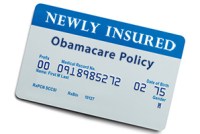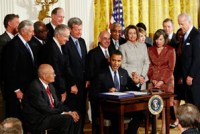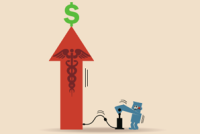Latest Morning Briefing Stories
Many On Medicaid See Boost In Benefits As Economy Improves
With an improving fiscal climate, many states are increasing benefits for Medicaid recipients and paying their providers more.
Texas and Florida Expand Medicaid
They were among 21 states required by Obamacare to broaden eligibility for school-age children.
Personal Attention Seen As Antidote To Rising Health Costs
Some of a hospital’s income now depends on keeping patients healthy. Kevin Wiehrs seeks to save hospitals money by keeping former patients out of the hospital.
Administration Says Hospitals Will Save $5.7B From Unpaid Bills Due To Health Law
About three-quarters of the savings will go to hospitals in states that expanded Medicaid.
FAQ: Children’s Health Insurance Program’s Future Is Unclear Under The Health Law
The federal-state program, called CHIP, is funded only for another year under the law, and advocates worry that without it, some kids may suffer.
Health Law Tempers New State Coverage Mandates
Provisions in the Affordable Care Act seek to curb individual states from setting new mandates requiring insurers to cover specific care but many local legislators are trying to work around that.
Health Care Prices: Many Moving Parts Veiled By Confidentiality Agreements
Unlike Medicare, private insurers do not publish their payments, and experts say the prices they pay hospitals for the same procedure vary widely.
California To Broaden Autism Coverage For Kids Through Medicaid
A South Los Angeles family illustrates the opportunities and challenges as the state takes its first steps toward expanding behavioral treatment for poor children.
Health Law Shows Little Effect In Lowering Children’s Uninsured Rate, Study Finds
Yet many uninsured kids would be eligible for coverage under Medicaid or the Children’s Health Insurance Program.
Census Bureau: Health Costs Inch Up As Obamacare Kicks In
Health and social spending as measured by the Census Bureau grew by only 3.7 percent from the second quarter of 2013 to the same quarter of 2014.
Can I Buy Coverage After Accident Injuries? Who Pays The Cadillac Tax?
Kaiser Health News consumer columnist Michelle Andrews answers readers’ questions.
Rural Enrollment Presents Continuing Health Law Challenges
State Obamacare decisions are key factors in how outreach strategies are taking shape for the next open enrollment period.
Maine Rolls Back Health Coverage Even As Many States Expand It
Gov. LePage’s decision to shrink, rather than expand, Medicaid has put strains on health providers as well as the poor.
Health Care Spending Forecast To Increase Modestly In Next Decade
Federal actuaries say the economic rebound and increasing number of people with insurance will push up spending.
North Carolina’s $10B Medicaid Challenge: Pay For Other States Or Take Federal Money?
State taxpayers could spend more than $10 billion by 2022 to provide medical coverage for low-income residents of other states while getting nothing in return.
Missouri’s Medicaid Applicants Get Put On Hold
Call center wait times climb even as the application backlog mounts and the state reports the single largest monthly drop in Medicaid enrollment in June.
Putting Teeth In Health Reform
Many North Carolina dentists refuse to treat Medicaid patients because of the low reimbursements, while the federal health law defines children’s dental insurance as an essential benefit” but doesn’t require parents to buy it.
Calif. Bill Would Protect Estates Of Many Who Received Medicaid
Federal law allows states to seize assets, such as homes, after a Medicaid enrollee has died to help cover the costs of the program’s spending on basic health services for people 55 years and older.
Low-Income Patients Face Hurdles To Care At Public Hospital In Miami
Jackson Health System offers free and reduced-cost treatment for those who qualify, but advocacy groups complain it fails to meet requirements for charity care.
One-Third Of Georgia’s Medicaid Applicants Still In Limbo
The state has one of the largest numbers of children who are Medicaid-eligible but still uninsured.



















